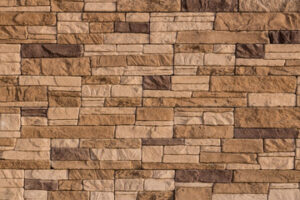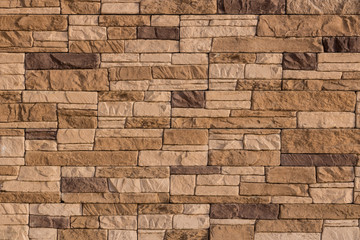Concrete Stone Facing is a popular choice for residential projects. It offers durability and a natural aesthetic that looks great on any home.
When properly installed, it also provides a concealed moisture barrier. It is essential to install the proper backing system, which includes a lath and a rainscreen. It is essential to fasten the lath to frame at least 6″ on center and lap at vertical and horizontal seams.
The color of a concrete stone veneer product is an important consideration, both for aesthetic and functional reasons. The right mortar dye can help the stone siding look uniform and cohesive, and it can also complement other aspects of a home’s exterior, such as the paint or stucco color. In addition, selecting a mortar color that matches the stone veneer can help reduce the likelihood of future repairs to the surface and surrounding materials.
Natural stone veneer is often made from a combination of different types of rock. Some of these rock types have a naturally weathered, or patinated, appearance, while others are smooth and refined by nature or by human hand. The weathering process gives a unique look to each type of stone, and it can add character to a structure’s façade.
Manufactured stone is also available in a wide range of colors, which can make it easier to coordinate with an existing home’s color scheme and style. Unlike cheap cultured wall stone, which is typically painted and can easily be distinguished from natural products, higher quality manufactured stone products are designed to look more authentic and blend in seamlessly with the surrounding structure.
Stone wall veneer can be installed in a variety of ways, including dry stacking and traditional grouted. Choosing the correct installation method for your project can help you save time and money, as well as ensure that the stone is properly protected from moisture and other elements.
Many manufacturers offer a variety of stone veneer styles, with some models inspired by popular designs and trends. These can include linear styles that install in a clean, dry-stack application and are suitable for commercial and residential projects. Others are influenced by classic stone designs and feature more textural finishes.
Another popular choice is sawn thin stone, which allows for a more varied texture and can be cut to precise dimensions. It’s also lighter than full-thickness natural stone, so it doesn’t require special footings or support ledges, and it’s easy to work with and install. Some manufacturers even offer stone accessories to pair with this type of veneer.
Texture
A high resolution seamless texture of a charcoal gray veneer wall stone cladding with natural face manufactured stone slabs stacked horizontally to create a highly textured contemporary facade wall treatment. This textured cladding is ideal for any architectural design, masonry or construction project. This textured cladding can be used for residential and commercial building projects including wall coverings, patio covers, entrances and more.
A common siding surface that looks like blocks of limestone, granite or other natural stone is actually a very thin veneer of molded concrete. Also called stone cladding, it can be installed in a traditional grouted style or with a dry-stack installation. It is generally less expensive than real stone and easier to install since there is no need for a foundation or other supporting structure underneath.
Manufactured stone is available in a range of colors and textures to complement or contrast with a home’s exterior paint color and trim. It is a good choice for areas that are exposed to the elements, but it can require regular cleaning to remove dirt and debris.
Choosing a texture for your stone veneer is important to get the look you want. For example, a rugged sandstone texture provides an antique appearance while a brushed finish has a soft, smooth surface. A rustic, carved face texture is another option that adds depth to the stone and a more organic feel to your landscape.
Most manufacturers of concrete stone veneer offer a number of different finishes for their products. They may mix the concrete with pigments and modified admixtures before casting it into molds, or they might apply the color after the stones are cured. Regardless, the stone should be protected from direct sunlight to prevent fading and discoloration over time.
When installing manufactured stone, you should always use a metal lath and a weather-resistant barrier as a base. This will protect the substrate behind it from moisture, which can damage the underlying wall. For outdoor installations, you should also consider applying a scratch coat of mortar before installing the stone to ensure that it adheres properly.
Durability
Concrete stone is a construction material sprayed into molds to create decorative manufactured stone veneer (MSV). It can clad an entire house or accent walls, and it’s available in a wide range of earth tones that complement siding and interior paint colors. It is an affordable masonry option for a home.
Depending on the application, concrete stone can be installed dry-stack or mortared. Both methods have advantages and drawbacks. Dry-stack installation is faster and can be done by a contractor without the need to use cement-based adhesives. However, it is more susceptible to moisture damage. It is important to choose a weather-resistant, non-film-forming masonry sealer for this type of wall. Mortared MSV is more traditional, but it can require the use of special masonry mortar and adhesives. It is less prone to moisture damage, but it can suffer from efflorescence over time if not properly maintained.
It’s a good idea to treat the MSV with a silane-based, non-film-forming, breather-type masonry sealer to reduce moisture buildup, which can cause discoloration or deterioration. If the stone will be placed near a swimming pool or hot tub, it should be treated with a chlorine-resistant masonry sealer as well. The chemical-resistant sealant will help prevent chlorine or other chemicals from seeping into the concrete and causing the surface to erode over time.
A natural stone wall’s thickness and rough, split-face texture adds visual interest to the building exterior. It can also clad a fireplace frame and establish an accent wall as the room’s focal point. However, natural stone is expensive as a cladding material and requires a specialized mason for installation.
Like other masonry materials, a stone wall is fireproof and resistant to environmental damage. It is also a thermal mass that can absorb and store heat but cannot slow down the transfer of heat through the wall like insulation or insulated materials.
For this reason, a stone wall may be more suitable in cold climates than warm ones. In a hot climate, the walls will likely be subject to intense sun exposure. It is important to install a protective awning or shade over the wall to limit its contact with the direct sun. It is also a good idea to provide actual insulated or glazed walls underneath the stone wall to block heat and sun from entering the structure.
Maintenance
While concrete stone veneer offers a lower cost alternative to traditional natural stone cladding, the material is not as resilient and may require more frequent maintenance than natural stone. This includes repairs and cosmetic wear. The color of manufactured stone can also fade, especially when exposed to intense sunlight. This is why it’s important to choose a product that has been designed and engineered to provide long-lasting beauty, even in harsh environments.
Most manufacturers offer a range of earth-toned colors that can complement or contrast with siding and interior paint to maximize curb appeal. Choosing the right shade can help your project stand out and achieve high-end looks that will impress homeowners and neighbors alike.
Since stone veneer is a concrete product, it will experience some expansion and contraction as moisture levels in the air fluctuate. To avoid damage, installers must provide proper expansion and contraction joints in walls. They should also ensure that a weather-resistant barrier and metal lath are installed over the substrate. These barriers will protect the substrate and prevent water leaks.
During installation, it’s important to keep the surface free of mortar dust as much as possible. If mortar does smear, it should be left to dry slightly before attempting to clean. Never use acid-based cleaners or power-wash the stone at any pressure. Acid-based cleaning products can discolor the stone and expose its aggregate, while high-pressure sprayers can etch the face of the brick.
In addition to moisture, one of the biggest concerns with any exterior wall is efflorescence. This is a water-soluble salt that appears as white residue on the surface of the stone. While it’s less common with mortarless MSV than it is with stone veneer that requires mortar, it is still an issue to be aware of and promptly address.
In addition to regular inspections, it’s a good idea to apply a silane or siloxane based breathable masonry sealer periodically to minimize water penetration into the brick and make it easier to clean. Always test a small area before applying the product to the entire surface of the brick.


